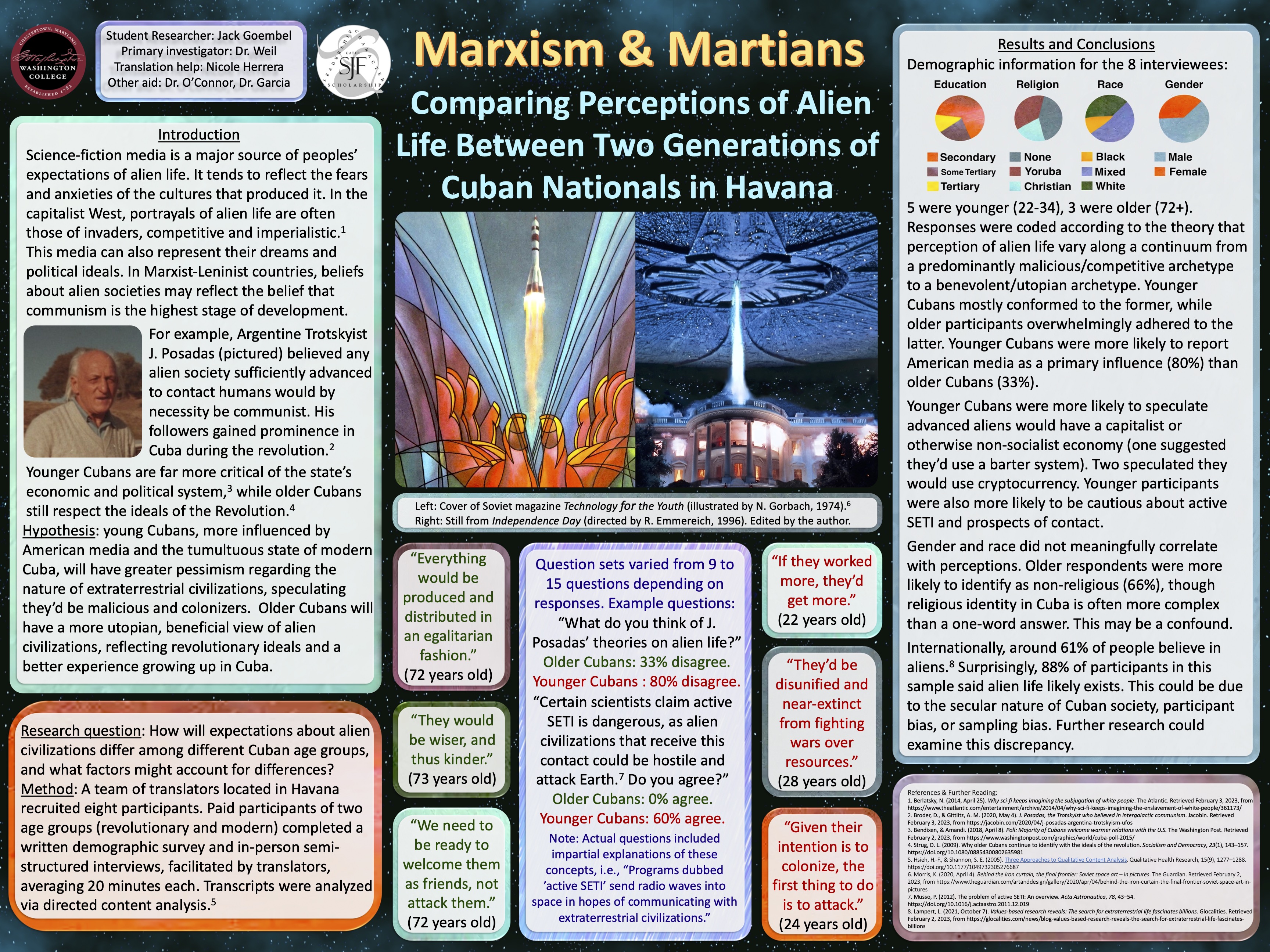MAJORS AND MINORS
- Biology Major
- Psychology & Chemistry Minors
LEARN BY DOING
- Greater Baltimore Medical Center Externship (2022), Kent County Health Department Vaccination Clinic Externship (2022), Washington Psychology Internship (2022)
- Eastern Psychological Association Presenter (2021-2023), WC GIS Internship (2019), WC Ad-hoc Committee on Shared Governance Member (2022-2023)
EXTRACURRICULAR ACTIVITIES
- Manna House Inc. Volunteer (Baltimore, MD), Washington College SGA (Environmental Committee)
- WC's Office of Academic Skills Psychology Tutor, WC Mock Trial Club (Treasurer & VP)
SUPPORT FROM DONOR PROGRAM
- The Barbara and Dan Measell '70 '68 Scholarship
- Washington Scholarship
The Truth is Out There
Jack Goembel
Class of 2023 • Baltimore, MarylandMAJORS AND MINORS
- Biology Major
- Psychology & Chemistry Minors
LEARN BY DOING
- Eastern Psychological Association Presenter (2021-2023), WC GIS Internship (2019), WC Ad-hoc Committee on Shared Governance Member (2022-2023)
EXTRACURRICULAR ACTIVITIES
- Manna House Inc. Volunteer (Baltimore, MD), Washington College SGA (Environmental Committee)
- WC's Office of Academic Skills Psychology Tutor, WC Mock Trial Club (Treasurer & VP)
SUPPORT FROM DONOR PROGRAM
- The Barbara and Dan Measell '70 '68 Scholarship
- Washington Scholarship
An unparalleled experience offered to Washington College students each January, the Cuba Experience is a once in a lifetime opportunity for students to visit Cuba and conduct real-world research into the culture, music, religion, and foods of Havana. Led by two WC faculty members, the Cuba Experience offers students the chance to pursue academic and passion projects alike.
Keen to take advantage of this research opportunity, Jack began brainstorming numerous research ideas and methods before landing on studying Cuban perceptions of extraterrestrial life, with a project aptly named “Marxism and Martians: Comparing Perceptions of Alien Life Between Two Generations of Cuban Nationals in Havana”.
“I started out juggling a lot of research ideas, including using surveys and incentives to figure out the legitimacy of people’s avowed moral systems, interviewing psychiatrists to find differences in their practices across geography, and determining how political beliefs impact people’s perception of alien life… I’m fascinated by the relationship between economic philosophy and perception of alien life, so the fact that Cuba [is] a socialist country – and, furthermore, one with different economic beliefs between generations – meant I could probably get some interesting insight into how that relationship manifested.”
Having been approved for Cater Society grant and successfully completing the IRB process, Jack moved forward with hypothesizing the differences in perceptions of alien life among Cuban generations. “My hypothesis was that younger Cubans, who are more influenced by American media and the turbulent state of modern Cuba, would hold a pessimistic view of advanced extraterrestrial civilizations, seeing them as malicious colonizers. On the other hand, I anticipated that older Cubans, shaped by revolutionary ideals and their experiences growing up in Cuba, would have a more optimistic perspective on the nature of advanced alien civilizations and prospects for first contact. This hypothesis was based in part on utopian trends in Soviet science fiction and Argentine Trotskyist J. Posadas' beliefs that advanced extraterrestrial civilizations must be communist.”
Utilizing a team of local translators, a group of eight participants were recruited from two age groups – those who grew up during Cuba’s revolutionary era, and those who experienced modern Cuba. From there, 20-minute interviews and demographic surveys were conducted, with a bit of help from the extensive preparation he did before the trip.
“Preparation is key! Reading up on Cuban history as part of the course helped contextualize a lot of the differences I saw in participants’ responses. It also meant I asked the right questions in the right order. For example, starting with easier, more frivolous questions before moving to politically charged ones was a good way to establish rapport and have participants more open to sharing their opinions. If I hadn’t done background research to on Cuba’s society, history, and relationship with the U.S., the answers I got wouldn’t have been as insightful.”
Having collected his data and explored all Havana had to offer, it was soon time for Jack to analyze and interpret the results using direct context analysis of the interview transcripts and demographic surveys; “Younger Cubans displayed a more pessimistic outlook on extraterrestrial civilizations and indicated a greater influence from American media. They expected violent first contact and imagined extraterrestrial societies as capitalist. Some even expressed explicit anti-socialist views. In contrast, older Cubans held a positive view of advanced alien societies, reportedly influenced by their personal experiences during their childhood and the values of the Cuban Revolution.”
Upon the completion of his project, Jack presented his findings at the Cater Society Open House in February of 2023 with great success, having found his time and experiences in Cuba to be vastly enriching to his undergraduate experience, citing it as “without a doubt, the coolest project I’ve ever done.”
Following his graduation, Jack will be applying to medical school with the goal of becoming a psychiatrist or primary care provider; “We’ll see where things go – if my time at WAC has taught me anything, it’s that you never know for sure what direction new experiences might take you.
To further explore The Cuba Experience and other experiential learning offering here at WC, check out WC’s Study Abroad program.


